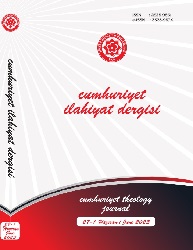Modern Dönemde Nahiv-Mantık Tartışması -Aristo Mantığı-Arap Grameri İlişkisi Üzerine Üç Görüş
Discussion on Logic and Nahw in the Modern Period –Three Views on the Relationship between Aristotelian Logic and Arabic Grammar
Author(s): Bünyamin AydınSubject(s): Logic, Syntax, Philosophy of Language
Published by: Cumhuriyet Üniversitesi İlahyat Fakültesi
Keywords: Arabic Language; Aristotelian logic; Arabic grammar; Ibrāhīm Al-Madkūr; ʻAbd Al-Rahmān Al-Hāj Sāleh; ʻAbduh Al-Rājihī;
Summary/Abstract: Discussions on the relationship between Aristotelian logic and Arabic grammar were continued by linguists of the modern period as was among the early period linguists. These discussions focused on the purpose and functions of logic and grammar, as well as whether logic was effective in the formation and development of grammar. Discussions about the mentioned effect brought up the concept of the originality of Arabic grammar. This study deals with the discussion of whether Aristotelian logic was effective in the formation of Arabic grammar; and aims to clarify matters such as the existence, if any, the mentioned effect and to what extent it occurred in terms of method and content. In the study, firstly, information will be presented in the historical context of the subject, about the works of Syriac grammar, the first Arabic translations of the logic, the works of Sībawayhi’s teachers that have not survived and the grammar schools of Alexandria and Pergamum. Then, the views on the discussion in question will be discussed by taking into account the other works of the authors, by referring to the basic grammar works, Aristotle’s logic books and some Aristotle translations made in both the classical and modern periods. In the discussion of whether Aristotelian logic has an effect on Arabic grammar, the expression “Arabic grammar “ refers to al-Kitāb of Sībawayhi and the works produced before him, but which have not survived to the present day, since the problem addressed in the study is whether logic has an effect on the formation of Arabic grammar. There is no discussion about the influence of logic in later periods. In fact, in the debates between Sīrāfī and Mattā, the traces of the objections developed against the logic and the intellectual disputes between the grammarians and the logicians can be followed. Regarding the formation of the Arabic grammar, the works of Abu’l-Aswad Al-Du’alī and his students are pointed out in the sources. It was stated that the fact of lahn was especially influential in the beginning of these studies, and besides, an intellectual effort to reveal the features of Arabic language and to study the Qur’ān in terms of language was also mentioned. After these basic studies, the prominent names in the period up to the works of Khalīl and Sībawayhi were divided into groups as part of Basra and Kūfa grammar schools. In this context, the debate on whether Aristotelian logic was effective in the formation of these studies has been dealt with by three views in the modern period. Ibrāhīm Al-Madkūr clearly states that Aristotelian logic has affected Arabic grammar in terms of content and method in the formative period. In order to prove this, after emphasizing the cultural environment in which Arabic grammar birth, he compares Sībawayhi’s Al-Kitāb with Aristotle’s studies on logic. According to him, combination of various factors, including logic, in the formative period or the fact that Aristotelian logic is effective in determining its direction does not detract from the value of Arabic grammar. ʻAbd Al-Rahmān Al-Hāj Sāleh, on the other hand, after referring to the studies published in the West and the Arab world on the discussion, states that the effect of logic on Arabic grammar was seen in later periods and emphasizes that it draws a completely different direction from logic in matters that are shown as examples of the existence of the effect. According to him, the first Arabic grammarian who used Aristotle’s words is Al-Rummānī and the effect of philosophy and logic began at the end of the third century (ah.), intensified in the fourth century, and Arab thought lost its originality. ʻAbduh Al-Rājihī, on the other hand, after making remarks about the historical process related to Greek grammar schools, works and Syriac grammar and the transfer of logic to Arabic; compares Aristotle’s expressions with the expressions of Sībawayhi by quoting from English and early Arabic translations. In the study, three texts in question will be listed according to their publication dates; and the main ideas, opinions and results emphasized in the articles will be discussed by giving different opinions on the same point; and in order to avoid repetitions the names Madkūr, Sāleh and Rājihī will be used to point to the authors.
Journal: Cumhuriyet İlahiyat Dergisi
- Issue Year: 27/2023
- Issue No: 1
- Page Range: 30-45
- Page Count: 16
- Language: Turkish

